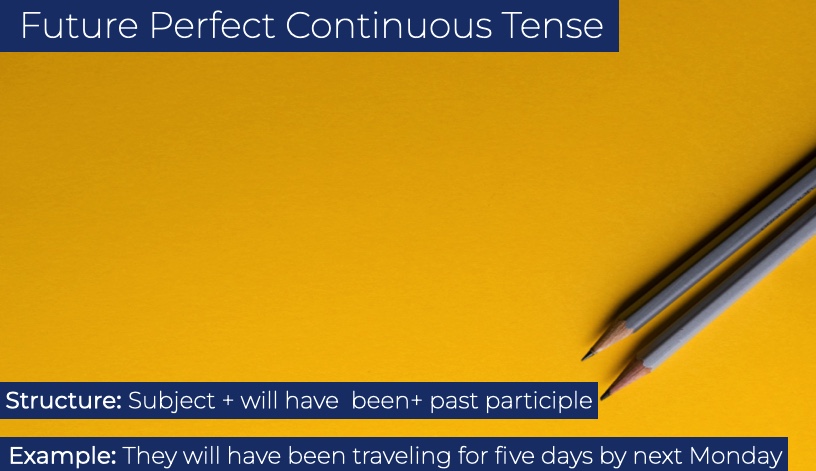Are you wondering how to talk about actions that will be ongoing up until a certain point in the future? The future perfect continuous tense is exactly what you need! This tense allows you to describe the duration of an activity that will be happening before another future event, making your conversations and writing more precise. Let’s dive into what the future perfect continuous tense is, how it differs from future perfect tense, how to use it, when to use it, along with examples and a mini quiz to test your understanding.

What is the Future Perfect Continuous Tense?
The future perfect continuous tense, also known as the future perfect progressive tense, is used to describe actions that will have been ongoing for a specific duration by a certain point in the future. It emphasizes the length of time an activity has been happening before a future moment. This tense is formed using “will have been” followed by the present participle (verb + -ing).
How is the Future Perfect Continuous Tense Formed?
The future perfect continuous tense is constructed with the subject, the auxiliary verbs “will have been,” and the present participle of the main verb.
Affirmative Sentences
In affirmative sentences, the structure is:
Subject + will have been + present participle
Examples:
- She will have been studying for three hours by the time you arrive.
- They will have been traveling for five days by next Monday.
Negative Sentences
For negative sentences, add “not” after “will”:
Subject + will not have been + present participle
Examples:
- She will not have been studying for three hours by the time you arrive.
- They will not have been traveling for five days by next Monday.
Interrogative Sentences
In interrogative sentences, place “will” before the subject:
Will + subject + have been + present participle?
Examples:
- Will she have been studying for three hours by the time you arrive?
- Will they have been traveling for five days by next Monday?
When is the Future Perfect Continuous Tense Used?
1. Actions Ongoing Up to a Specific Future Time
The future perfect continuous tense is used to describe an action that will be ongoing and continue up until a specific time in the future.
Example:
- By 10 PM, I will have been working on this project for eight hours.
2. Actions Ongoing Before Another Future Event
It is used to indicate that an action will be ongoing before another event occurs in the future.
Example:
- They will have been living here for a year when they celebrate their anniversary.
3. Emphasizing Duration in the Future
To emphasize the duration of an action that will continue up to a specific future point.
Example:
- By next summer, she will have been teaching at the school for ten years.
What’s your English level?
Discover your level now: A1/A2/B1/B2/C1/C2 and GET your certificate!
Examples of the Future Perfect Continuous Tense
- She will have been reading the book for a month by the time she finishes it.
- He will have been exercising for an hour by the time you get here.
- We will have been waiting for the bus for thirty minutes by the time it arrives.
- They will have been discussing the issue for hours by the time a decision is made.
- I will have been working at the company for five years next month.
Future Perfect Continuous Tense Exercises
- She ________ (study) for hours by the time you arrive.
- They ________ (not work) on the project for long by the deadline.
- Will you ________ (learn) Spanish for a year by next summer?
- He ________ (train) for the marathon for months by race day.
- We ________ (live) in this house for ten years by December.
- ________ they ________ (travel) for days by the time they reach their destination?
- I ________ (not read) the book for long by then.
- She ________ (write) her novel for two years by the time it’s published.
- They ________ (not talk) for an hour by the time the meeting ends.
- Will you ________ (study) for the test for a week by next Monday?
Answers:
- will have been studying
- will not have been working
- have been learning
- will have been training
- will have been living
- Will, have been traveling
- will not have been reading
- will have been writing
- will not have been talking
- have been studying
By understanding and practicing the future perfect continuous tense, you can describe future actions with more nuance and detail. Use this guide to master this essential aspect of English grammar and enhance your communication skills!





